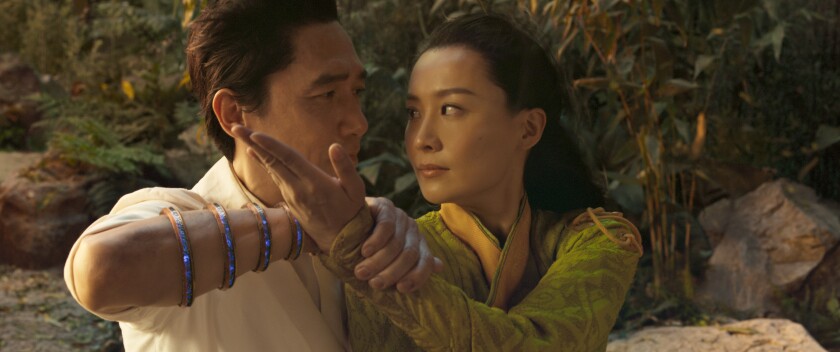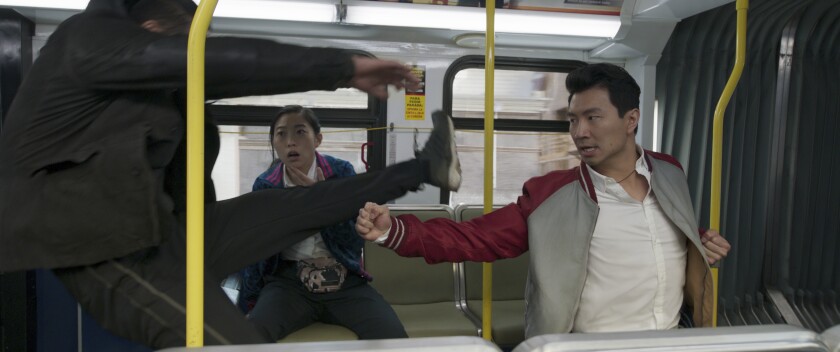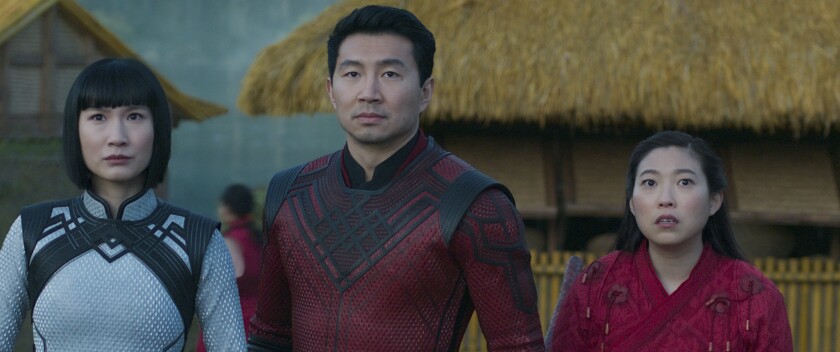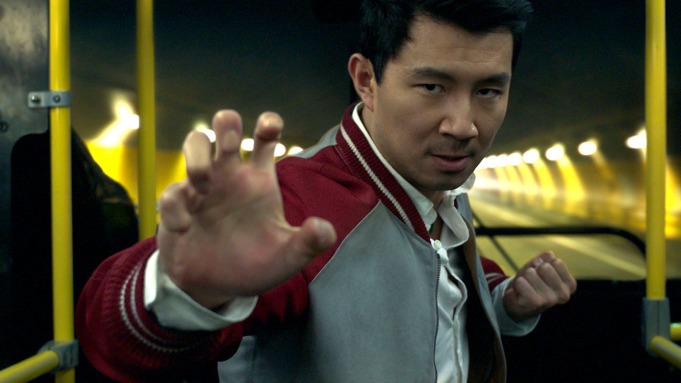‘Shang-Chi’ shouldn’t have to carry the weight of Asian representation within the MCU, but three writers discuss what it means that it does.
Spoiler alert: The following conversation discusses the entirety of “Shang-Chi and the Legend of the Ten Rings” and is intended to be read after you’ve seen the film. For spoiler-free reads please check out our review, our Q&A with Awkwafina and Kumail Nanjiani on their MCU debuts, our feature on how “Shang-Chi” came to be and our episode of the Asian Enough podcast with Simu Liu before coming back later.
Justin Chang: A few weeks ago, Simu Liu, who plays the title Marvel hero in “Shang-Chi and the Legend of the Ten Rings,” issued an attention-grabbing Twitter clarion call on behalf of his new movie. “We are not an experiment,” he wrote. “We are the underdog; the underestimated. We are the ceiling-breakers.” The tweet goes on — if you pay even the slightest attention to the Marvel Cinematic Universe, this isn’t the first time you’re hearing about it — and it was interpreted by many as a thinly veiled rebuke of Disney Chief Executive Bob Chapek, who had recently characterized “Shang-Chi’s” unusual 45-day release window as “an interesting experiment.”
There are a lot of ways to interpret Liu’s comment: as a misunderstanding, since Chapek was speaking about a distribution strategy rather than a movie; as an apt critique of an entertainment industry that routinely promotes diversity with one hand and dispenses micro-aggressions with the other; and as a highly visible (if relatively mild) example of an actor speaking truth to the Marvel-industrial complex’s power. My own takeaway? While I grasp the diminishing, marginalizing implications of the word, I frankly wish more Marvel movies were experiments, wish more of them were willing to scribble outside this franchise’s ever-exacting narrative lines and show a little more pizzazz and personality.
The best parts of “Shang-Chi and the Legend of the Ten Rings” manage this — imperfectly, but sometimes thrillingly. Part of this is due to the obvious but still-noteworthy fact that Liu and his gifted co-stars, including Awkwafina, Meng’er Zhang and Michelle Yeoh, are all actors of Asian descent in Marvel’s first Asian-led, Asian-ensemble superhero movie. Part of it is due to a clever, time-bending script (by Dave Callaham, Destin Daniel Cretton and Andrew Lanham) that doubles as both a wrenching drama of family dysfunction and a dry comedy of cross-generational, cross-cultural conflict. And most of it, as I’ve argued at length in my review, is due to the casting of Tony Leung as Shang-Chi’s estranged father, Xu Wenwu, a.k.a. the Mandarin — a genius choice that gives us the most memorable Marvel villain in ages and beautifully, even subliminally, connects a piece of studio product to a rich, vibrant canon of Asian cinema.
Tracy and Jen, what did you think of “Shang-Chi and the Legend of the Ten Rings”? And if I may ask: Do you find it as annoying as I sometimes do to have to process this movie as not just a movie, but as a Cultural Event/Representational Milestone?

Tracy Brown: I am more annoyed that these milestones still exist. “Shang-Chi” is the 25th movie in the Marvel Cinematic Universe. The franchise, now in its “Phase Four,” has been ongoing for 13 years (and counting). In that time Marvel Studios has made more MCU films starring white men named Chris than it has films that center superheroes of color. Or women, for that matter.
Obviously, this is not a Marvel-only problem and is reflective of larger Hollywood issues. I’m also annoyed by the additional pressures that get foisted upon films that are representational milestones from multiple directions.
That said, I thought “Shang-Chi” made for an endearing and exciting origin story. It was a fun MCU take on martial arts-infused fantasy grounded in Chinese and Chinese American culture that lets you more or less forget it’s a piece of a larger franchise puzzle until the very end — and it left me curious about what’s to come.
At its core, this was a story about love and grief and figuring out who we are and who we’re meant to be — which are all really potent themes, especially in the world we‘re all in right now. And “Shang-Chi” managed that while also delivering some of the most spectacular fight choreography of any MCU movie. I left the screening feeling both thrilled and relieved.
Jen Yamato: About that feeling you’re describing, Tracy — a few years ago a trio of brilliant Asian American minds coined the perfect phrase to describe it: the “rep sweats.” Credit to comedian Jenny Yang, “Angry Asian Man” writer Phil Yu and Joanna Lee for nailing such an evocative description for the creeping, sinking feeling so many of us have felt in the pit of our stomachs when we’re about to see our long-ignored communities represented on screen … whatever you do, groundbreaking movie/TV show — just don’t set us back.
Which is to say, I’ve learned it’s better to go into a certain echelon of history-making, $100-million-plus budgeted event film with managed expectations. To be perfectly honest, I went into “Shang-Chi” with a bar set intentionally very low, because carrying high hopes into studio blockbusters when you have even a small personal stake in the outcome is often a soul-crushing exercise in self-punishment. And with all that’s going on today, who has the energy?
So I was pleasantly thrilled when, early on in “Shang-Chi,” the 1 California MUNI bus hurtled through San Francisco Chinatown in a set piece that struck a decisively electric tone — and not just because Liu was fighting half a dozen bad guys and capably pulling off his own stunts while Awkwafina channeled Sandra Bullock in “Speed” at the wheel of an out of control bus. It’s a dazzling sequence, not overly reliant on VFX, that establishes character, relationships, history and the inner conflict that grounds the story to come; it’s not cut short, distractingly edited or as boringly weightless as most blockbuster action is today.
Honestly, if “Shang-Chi” was a two-hour real-time fight set entirely on that bus, I wouldn’t mind. (The recent Taiwanese animated short “Night Bus,” coincidentally, proves that plenty of intrigue and drama can unfold on public transportation.) Anyway, that was the moment I started to relax. Which is not to say I ever relaxed completely. A film still needs to earn its payoffs, and while I agree with you, Justin, that it does so imperfectly, “Shang-Chi” left me curious to see what more this character will get to do in the MCU.

Chang: Having recently rewatched “Speed” myself, Jen, I too wouldn’t mind seeing a two-hour real-time public-transit version of “Shang-Chi,” which, again, sounds as close to experimental as the MCU is likely to get. You, Tracy and I all seem fairly pleased with the quality of the action scenes in this movie — partly, I suspect, because the Marvel bar has been set so ridiculously low in that department. It’s almost as if directing visually coherent, viscerally gripping action scenes would be an expression of too much auteur individualism, too much personality, for this stylistically homogeneous franchise. I don’t think the fight scenes in “Shang-Chi” rise to the level of, say, the best moments in “The Raid” movies or the “John Wick” movies, to name some of the more galvanizing action films of recent vintage.
But still, what a pleasure to see scenes that have obviously been staged and blocked and sculpted with care, and that haven’t been chop-chop-chopped beyond recognition. The echoes of Jackie Chan and even Stephen Chow playfulness that many have noted are a kick, and I even got some pleasing Tsui Hark-y vibes from that vertiginous nighttime scaffolding scene in Macao. And Liu is simply terrific in these moments, doubtless owing at least in part to his own history as a stunt performer. Because “Shang-Chi” was clearly conceived on some level as a tribute to and playful riff on classic Asian cinema, and especially classic Asian action cinema, it frankly has to be more competent in that department than, say, “Thor: The Dark World.”
There’s probably some cultural subtext in there about intergenerational shame and not embarrassing yourself in front of your elders and influences, which ties a bit into what Jen was saying about these Representational Milestones and the anxiety we sometimes feel that they might let us down. And yet, maybe for that reason, I actually found myself approaching “Shang-Chi” with almost exactly the opposite mind-set: It’s not that I wanted it to be mediocre or terrible — I never want a movie to be mediocre or terrible! — but I was certainly prepared for it to be, and it would have been frankly liberating to say so if it were.
Alas, it isn’t terrible. It’s quite good, in fact, and sometimes even better than that. Which, I hasten to add, is more than it should have to be. A movie like “Shang-Chi” shouldn’t have to be a masterpiece or a representational triumph to exist, and it shouldn’t have to be a box-office smash in order to justify more movies like it. All of which helps me perhaps understand Liu’s Twitter remarks better than I did a few days ago: Overreacting or not, he was rejecting an all-too-prevalent corporate mind-set that dismisses and condescends to underrepresented artists, sometimes by expecting perfection or better.
Brown: I agree, Justin, that movies like “Shang-Chi” shouldn’t have to be perfect or saddled with extra expectations. But I think in this specific instance, Marvel sort of painted itself into a corner of needing “Shang-Chi” to right its previous wrongs, in a sense, which just adds more unfair pressure.
There is, of course, the fact that the character’s comic book origins are steeped in racist stereotypes — Shang-Chi was originally created in the ’70s as the heroic son of the infamous “Yellow Peril” villain, Fu Manchu. Marvel is far from the sole perpetrator of racist tropes and clichés in pop culture, but there is a heightened awareness now of how harmful they have been.
It would be one thing if Marvel’s missteps were confined to the comics of the ’70s and ’80s, but the MCU also doesn’t have the best track record when it comes to handling the racist comic book legacies of its Asian characters, such as the Mandarin and the Ancient One. “Iron Man 3″ (2013) tried to sidestep anything problematic by setting up the Mandarin as the villain, only to reveal that he was an imposter. Similarly, ”Doctor Strange” (2016) tried to avoid certain magical Asian tropes around the Ancient One by whitewashing the character instead.
I had that history in the back of my mind going into “Shang-Chi,” so I was delighted by the way it purposefully subverted so many tired stereotypes. As much as that close quarter fight in the speeding bus was exciting, I also appreciated how it helped solidify Katy as the go-to driver of the movie. (Calling people out on their “bad Asian [woman] driver” assumptions and jokes is my brand.)
And despite being wary about the idea of a “real” Mandarin, I thought Wenwu was a great rebuke to the historically xenophobic caricatures of Asian comic book villains. He was complicated and captivating and so very human, despite being an immortal crime lord with a magical weapon.

Yamato: That brings to mind the gorgeous forest meet-cute we get early on, flashing back to how Shang-Chi’s parents — Leung’s Xu Wenwu and Fala Chen as Li, a master of martial arts in her own right — first cross paths. Cretton, cinematographer Bill Pope and a gifted action choreography team serve some major slo-mo Zhang Yimou-inspired “House of Flying Daggers” rom-combat swagger here in a breathtaking exchange that brings otherwise absent heat and grace to the MCU.
I’d add that it’s the human moments that lend any ounce of weight to the high-flying heroics that keep powering tentpole after tentpole. Shang-Chi’s low-key pre-superhero life feels a lot to me like how Paul Rudd’s Scott Lang is living in the “Ant-Man” installments: refreshingly mundane. Appealingly average. I bet they’d get along. As it happens, both characters live in San Francisco of all places, so they wouldn’t need magical wizard portals to cross paths within the canon.
And while Lang sings karaoke at home in “Ant Man and the Wasp,” points to “Shang-Chi” for going the extra mile for karaoke representation. Renting out a noraebang-style private room with your bestie to belt out songs all night — who among us hasn’t done that once or twice, or 50 times? (Oh, yes, I caught that brief flash of a maybe-karaoke scene in the “Eternals” teaser!) Relatibility is keyword du jour these days in Hollywood for good reason. Are you truly invested until you know the thrill of feeling seen by a $100-million-plus four-quadrant blockbuster cinema product?
As much as I was on board for the “Shang-Chi” ride, I do have lingering questions including, in no particular order — so … what’s Katy’s deal now? Can Xialing get her own movie? Is it better to have one shirtless scene but no love interest, or to roam free from the shackles of gendered storytelling convention and not have one at all? Would you rather fight 100 Morris-sized dragon or one dragon-sized Morris? How many wonders can one (cinematic) universe hold? But I guess those are questions for another day in the MCU ….

